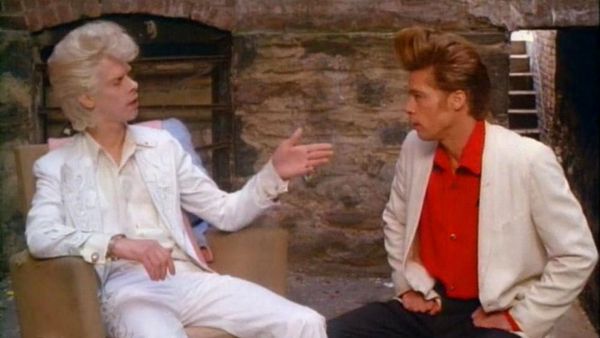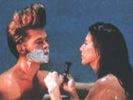Eye For Film >> Movies >> Johnny Suede (1991) Film Review

Life is for winners and losers, aces and deuces, givers and takers, good guys and bad guys. Between the acquisition and the attempt is a middle road down which damaged delinquents and rookie renegades stumble. Johnny sings Some People Call Me A Teenage Idol. He lacquers his hair in the style of a cowpat. He's stranded in Seedy Street.
Johnny knows one thing - he'll be a star.

"My music comes out of me anywhere, anytime," he drawls. "There's no date on it."
He likes tradition, the half-remembered dress code of Elvis and Jerry Lee, the dumb pleasures of once-tantalising talent, the safety of knowing that moon still rhymes with toon.
He hikes home after another no-night at the club, when he hears squealing from an alley. A chick is down among the trash cans. There are men with her. One offers him a special favour. He has the face of a depraved waiter. Johnny finds a phone booth and calls the cops. There's a bump on the roof. Someone's dropped a hat box. Inside is the perfect pair of black suede sneakers.
Johnny lives with a decaying carrot in his fridge and song lyrics scribbled on the walls. Effluence of a lazy life floods the floor space. His friend Deke (Calvin Levels), a black kid with pragmatic ideas about the need to finance indolence, forces him out to paint apartments for money. Deke is the keyboard wizard of his imaginary band, Johnny & The Persuaders, despite the fact that he digs street rhythms, is a killer on the drum machine and thinks Johnny's ballads are soft on content.
With his new pedi-accoutrements, things happen. The local teenscene sensation Freak Storm (Nick Cave), a skinny Lou Reed clone in a permed white wig, talks to him in the toilet. Darlette (Alison Moir), a girl with fried onions for brains and the looks of a high school vixen, says, "With those shoes, you remind me of a prince in a fairy tale."
Darlette is rich, disturbed, sexually signalling and has an older boyfriend. This doesn't stop Johnny falling head-over-suedes for her, which puts him on the losing side, because Darlette is a play doll with burnt out batteries.
Freak Storm describes his music as "sort of free form experimental" and offers Johnny a song about his early life.
"I don't know much about my daddy," he says. "Except he shot a man five minutes after I was born."
Johnny rehearses the song in his room. It sounds bluesy and depressing. Later, he stops a midget looking up the skirt of a teacher (Catherine Keener). She is different from Darlette, intelligent, inquisitive, unhitched. Also, she's not shy about telling Johnny what to do under the sheets, since he's fingers and thumbs in all the wrong places.
A film like this - low budget, writer/directed (Tom DiCillo), style conscious, left field - is made as a future cult classic. Johnny represents the hopes and aspirations of every 15 watt teenage troubadour, dressed to possess and yet too dim to deliver. Brad Pitt, at that time the Dwight Yokum lookalike from Thelma And Louise, has a delicate task gauging the degree of stupidity demanded of Johnny. In the end, he goes for the slow and it works.
The influence of Jim Jarmusch is stamped on the scenes of sluggish langour and considerable effort has been made to grungify Johnny's pad. DiCillo has an ear for non sequiturs and a healthy admiration for ironic contradiction.
The ending is a cop out - failures don't need to be saved, only savoured. Even if Johnny Suede doesn't make waves, big enough to cause damage, it stirs the mud at the bottom of the pool.
Reviewed on: 11 Sep 2005





















